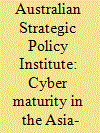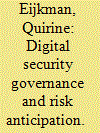|
|
|
Sort Order |
|
|
|
Items / Page
|
|
|
|
|
|
|
| Srl | Item |
| 1 |
ID:
131314


|
|
|
|
|
| Publication |
Australia, Australian Strategic Policy Institute, 2014.
|
| Description |
71p.Pbk
|
|
|
|
|
|
|
|
|
|
|
|
Copies: C:1/I:0,R:0,Q:0
Circulation
| Accession# | Call# | Current Location | Status | Policy | Location |
| 057770 | 005.8095/AUS 057770 | Main | On Shelf | General | |
|
|
|
|
| 2 |
ID:
112575


|
|
|
|
|
| Publication |
New York, CRC Press, 2011.
|
| Description |
xv, 325p.Pbk
|
| Standard Number |
9781439851234
|
|
|
|
|
|
|
|
|
|
|
|
Copies: C:1/I:0,R:0,Q:0
Circulation
| Accession# | Call# | Current Location | Status | Policy | Location |
| 056534 | 005.8/GRA 056534 | Main | On Shelf | General | |
|
|
|
|
| 3 |
ID:
135740


|
|
|
|
|
| Publication |
New Delhi, Institute for Defence Studies and Analyses, 2014.
|
| Description |
84p.Pbk
|
| Series |
IDSA Monograph Series No.42, December 2014
|
| Standard Number |
9789382169482
|
|
|
|
|
|
|
|
|
|
|
|
Copies: C:2/I:0,R:0,Q:0
Circulation
| Accession# | Call# | Current Location | Status | Policy | Location |
| 058079 | 005.8/SAM 058079 | Main | On Shelf | General | |
| 058080 | 005.8/SAM 058080 | Main | On Shelf | General | |
|
|
|
|
| 4 |
ID:
130993


|
|
|
|
|
| Publication |
2014.
|
| Summary/Abstract |
The anticipatory turn in managing security and safety relies not only on innovative technological tools, but also on social practice. New information and communication technology, for instance, facilitates digital security governance1 which entails the collection, processing, storage, and sharing of digital personal data for risk profiling, but little is known about the role of security officials in preemptive security. Although people, or "data subjects," are categorized according to a (predefined) level of potential threat on the basis of digital data, it is often unclear which actor or agency was responsible for this categorization. This is especially unclear when information was shared across the globe between several security agencies and/or private companies. Nonetheless, as the assessment of risk or dangerousness affects someone's real-life opportunities, privacy rights or claims to something or someone are likely to be evoked.
|
|
|
|
|
|
|
|
|
|
|
|
|
|
|
|
| 5 |
ID:
046097


|
|
|
|
|
| Publication |
Boston, Artech House Inc., 2001.
|
| Standard Number |
1580531768
|
|
|
|
|
|
|
|
|
|
|
|
Copies: C:1/I:0,R:0,Q:0
Circulation
| Accession# | Call# | Current Location | Status | Policy | Location |
| 046754 | 005.8/CAN 046754 | Main | On Shelf | General | |
|
|
|
|
| 6 |
ID:
192082


|
|
|
|
|
| Summary/Abstract |
In the global interconnected economy, China-made information-collecting technologies such as closed-circuit television (CCTV) surveillance cameras have become popular products for routine video-based surveillance. Hikvision and Dahua are the two largest global suppliers of CCTV cameras, with both companies supplying their products to over 200 countries. Despite their popularity, national security concerns are commonly cited when adopting these cameras, citing manufacturer links with the Communist Party of China (CPC), cybersecurity vulnerabilities, and sales recorded in the Xinjiang region, that has records of human rights violations. This paper is structured in three parts: first, we explore the predominance of China-made information-gathering technologies in Australia; second, we summarise common national security concerns usually associated with China-based technology manufacturers; and third, we propose regulatory measures to regulating China-made CCTV cameras in Australia. The paper suggests that while state and Federal decision-makers are free to remove Chinese CCTV surveillance cameras, they should avoid overt politisation. Overall, a stronger focus should be placed on evaluating cybersecurity risks of Internet of Things (IoT) information-collecting technologies and considering their timely and effective regulation from the perspective of individual and national interests.
|
|
|
|
|
|
|
|
|
|
|
|
|
|
|
|
|
|
|
|
|